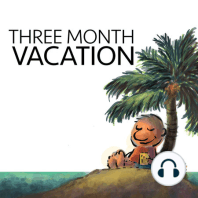21 min listen

The Resistance Game: Can Resistance be Beaten? - Part One
The Resistance Game: Can Resistance be Beaten? - Part One
ratings:
Length:
30 minutes
Released:
Apr 2, 2016
Format:
Podcast episode
Description
Resistance seems like an overbearing force in our lives We want to achieve a lot, but as soon as we get started, resistance kicks in. But did you know there are ways around resistance? Resistance loves a loner. If you’re working alone, you’re just setting yourself for an encounter with resistance. Resistance loves to play the game of winner. We need to put resistance in second place. Here’s how to go about the task of winning the resistance game. ============= Resistance loves a loner Because loners have limited energy. They start out on a project, all excited about what’s about to unfold. Then, for some reason or the other, they lose their way. And that’s when resistance gangs up on the loner big time. It’s not much of a fight. The loner is already exhausted. One tiny tap on the head from resistance, and the loner falls into a heap on the floor. But this miserably one-sided bout could be avoided with the understanding of group work. In Africa there’s a saying: If you want to go quickly, go alone. If you want to go far, go with a group. And resistance detests groups. And there are several reasons why a group helps you get a project done with far more efficiency and a lower failure rate. So how do groups help? 1) Release of Pressure 2) Exponential Learning 3) Support 1) Release of Pressure The toughest part of a project is dealing with the pressure. And a release of that pressure is needed to give you a breather. When you rant and rave alone, it’s kinda depressing. When you’re suffering alone, you think it’s something to do with your talent, or your genes, or that you’re a loser (yes, everyone feels super-lousy often enough). And having someone to just listen to your rant is amazing therapy. You rant, you’ve been heard and now it’s time to get back to work, because you have a ton of mistakes to make, and learning to look forward to. 2) Exponential learning Mistake making is frowned in our society. We love to get things right the first time. And yet all of us know that it’s impossible to learn without making a ton of mistakes on any project, no matter how familiar we are with the project. The problem is that mistake-making, instructive as it is, is also terribly depressing. When you’re going round in concentric circles, your exhaustion builds up rapidly. However when you’re in a group, you learn from someone else’s mistakes, thus getting a bit of respite from the exhaustion factor. When a group shares its learning and mistakes, everyone learns and everyone gets a little samba in their steps because you’re not just learning, but it’s exponential learning. You’re learning from four-five mistakes every day, and guess what? Most of those mistakes aren’t yours. 3) The third factor is just one of support While resistance can take on a loner, it’s a lot harder to take on a group. If someone falls, there’s usually someone to pick you up. If someone is struggling, there’s someone to help. If someone has questions, there are answers that help you move along. Working by yourself, you not only miss the ongoing support, but the struggle wears you out. And inevitably you give up. Now this kind of group support doesn’t necessarily work for all kinds of projects Sometimes the project is just to clean your desk. You could do with ranting and group support, but it’s an overkill. Besides it probably takes under an hour to get even the messiest desk tidy. But if this seemingly mundane desk has to go on over a longer period of say, six to eight months, then you definitely need the power of the group. In fact at Psychotactics, groups form a critical part of the project experience If we take just the Copywriting Course for instance, the three months of learning and implementation are physically exhausting. If you were to try and replicate the same pace by yourself, you’d give up in a week or less. But with a group, 75-80% make it to the finish line. When you consider the sheer intensity of the Copywriting Course, you should have the figures the other
Released:
Apr 2, 2016
Format:
Podcast episode
Titles in the series (100)
Why We Sell Less: The Root of Confidence: The hardest thing in business?or life is the factor of confidence. Whether you're in online marketing, selling products or services, or run a physical store, the confidence goes up and down. And yet, confidence is what creates sales. Sales, after all,... by The Three Month Vacation Podcast